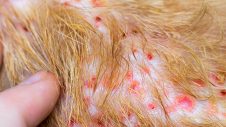Is Your Pet Itchy? They may have Allergic Dermatitis.
What is Allergic Dermatitis?
Allergic Dermatitis is a general term given to both dogs and cats that itch, rub, chew, lick, bite, scoot or scratch themselves. It is very common and encompasses atopic dermatitis, flea allergy dermatitis, food allergy and contact dermatitis. Yet it is often a misunderstood or underdiagnosed condition.
As the name implies, allergic dermatitis results from an allergy. However, most of the damage seen on the skin is often not associated with the original cause but with the damage your pet does to him or herself through biting, licking or scratching, that is self-induced damage. It is very important that both the cause of the condition is diagnosed and the irritation is relieved.
Atopic dermatitis, or atopy, is a very common cause of allergic dermatitis. Most atopic dogs will have skin issues in the warmer months of spring and summer, reducing or becoming absent in the cooler months. If left untreated, these dogs will continue having seasonal itch until the original cause is treated. Visit your nearest Greencross Vets to learn more about itchiness and skin care for your pet
How is Atopic Dermatitis Diagnosed?
Diagnosing the cause of atopic dermatitis can be challenging. Sometimes it may be diagnosed through a process of elimination and results of skin tests taken within the clinic. Your everyday observations and history of the problem combined with diagnostic tests and veterinary expertise will help determine the allergy that is the source of the problem Blood tests and skin tests are available although the latter tend to be referred to specialist veterinary dermatologists. Every pet is unique, your veterinarian will ask questions about your pet to learn more about your pet’s history and experience.
What is the ‘Process of Elimination’?
You may be asked by your vet care team about where and what time of the year your pet is scratching, your pet’s flea control, diet, where your pet sleeps, where they spend time outdoors, what your pet is washed with or any recent changes in your pet’s routine. Previous treatment is usually discussed as this often yields information also. There may be more than one cause of the skin problem, so it is important to be as thorough as possible and take note of any recent changes in your pet’s environment.
Some of the more common reasons for atopic dermatitis include, pollens airborne particle, moulds, yeasts, and mites just to name a few
Once the source of the irritation has been determined, an appropriate and personalised treatment plan will be outlined. Sometimes the allergy can be managed quickly, however sometimes it can be a slow process requiring careful management from everybody in your household. Visit your nearest Greencross Vets to treat your pet.
How is atopic Dermatitis Treated?
The treatment of atopic dermatitis is largely dependent on the underlying cause. It often consists of providing immediate short-term relief through medication to bring immediate relief to your pet. This may include injections, tablets, shampoo or conditioners to allow the skin to return to normal while the cause of the allergy is being brought under control. Your vet will prescribe a detailed treatment plan to help your pet that may involve a change in diet
This process may seem tedious at times and it may be tempting to just give the medication, rather than investigating to treat the problem at its source. Wherever possible, an attempt should be made to work with your vet care team to diagnose the cause of the allergy before resorting to continued use of medications. Densensitisation injections can be potentially successful.
It is vitally important that skin disease is treated as early as possible. Long-term skin damage usually produces permanent changes, which will render treatment difficult. While supplements and home remedies do help, correct and proper diagnosis and veterinary advice in the early stages are key to helping your pet enjoy a comfortable and itch-free life with healthy skin.
If your pet is itchy and uncomfortable, please visit your local Greencross Vets today. We can help to alleviate and prevent that dreaded ‘Summer Itch’.

 Greencross Vets
Greencross Vets 










